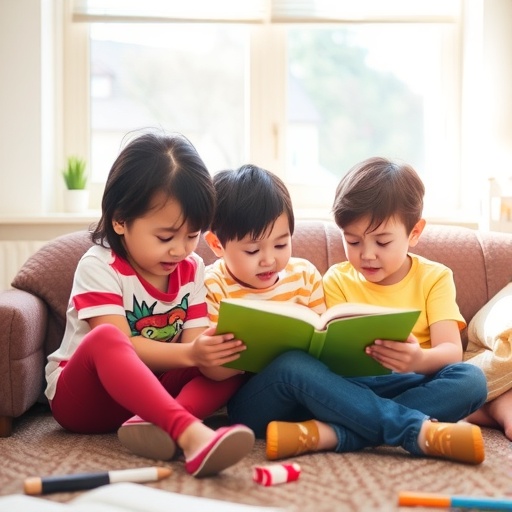Parental engagement and satisfaction in early childhood education represent critical components that are increasingly recognized for their impact on a child’s development and learning trajectory. The research titled “Parental Engagement and Satisfaction in Early Childhood Education: The Mediating Role of Home Literacy Environment” by Kaya, Ü.Ü., Demircan, H.Ö., and Altun, D. delves into this intricate relationship, shedding light on various aspects that influence a child’s educational experiences.
The study investigates the interplay between parental involvement and children’s literacy outcomes, emphasizing the role that the home literacy environment plays as a mediator. This concept posits that the resources, activities, and overall environment surrounding literacy in the home significantly affect how parents engage with their children during their formative years. The findings of this research are timely, given the rising importance of understanding how familial factors contribute to educational success in early childhood.
An examination of parental engagement reveals various dimensions, including emotional support, active involvement, and communication strategies. Each of these facets plays a role in how children perceive learning and their overall educational experiences. The emotional bond formed through parental encouragement can translate into a greater confidence in children, fostering a positive attitude toward learning. Furthermore, active participation by parents in educational activities enhances a child’s ability to grasp complex literacy concepts, ultimately leading to improved performance in school.
In analyzing the home literacy environment, the study underscores the importance of access to books, engaging literacy-related activities, and the frequency of reading interactions. These elements create an enriching setting where children can explore language and literacy at their own pace. Such an environment not only supports children’s language acquisition but also fosters a love for reading, which is critical for long-term academic success.
The researchers employed a comprehensive methodology, surveying a diverse population of parents and educators to gather robust data. Their approach allowed for a nuanced understanding of the perceptions and practices surrounding parental engagement and home literacy resources. By using a multi-faceted lens to view these interactions, the study provides insights that transcend simplistic interpretations of parental involvement, advocating for a more holistic understanding of the factors at play.
Among the noteworthy findings, the study highlights that children whose parents actively engage in literacy activities are more likely to demonstrate advanced language skills. This correlation suggests that the quality and quantity of parental involvement directly impact educational outcomes for young learners. Furthermore, the research indicates that children from homes boasting a rich literacy environment exhibit higher satisfaction rates regarding their educational experiences.
The implications of these findings resonate deeply within the educational community, pushing for advocacy toward increased parental involvement in early childhood education. Policymakers and education leaders are encouraged to devise programs that not only support parents in their engagement efforts but also empower them through accessible literacy resources and educational workshops. Such initiatives can bridge gaps between home and school, fostering an environment where children’s educational needs are holistically addressed.
Moreover, the study emphasizes the importance of educator support in promoting parental engagement. Early childhood educators play a pivotal role in guiding parents on effective strategies to enhance their child’s learning environment. This partnership between parents and educators can cultivate a stronger framework for learning, wherein both parties collaborate to nurture a child’s learning experience.
In reflecting upon the stakes involved, the research foregrounds the necessity of early intervention strategies that target both home literacy environments and parental engagement. The potential for fostering a generation of proficient learners through improved literacy practices cannot be overstated, nor can the value of parental involvement be diminished. Redirecting focus toward these aspects is paramount for developing effective educational policies.
In conclusion, the work by Kaya, Ü.Ü., Demircan, H.Ö., and Altun, D. serves as an essential touchstone for understanding the complex dynamics of parental engagement and home literacy. Their findings encourage ongoing dialogue regarding the optimization of early childhood education paradigms that incorporate family dynamics as a core component. As we look to the future of educational research and practice, the implications drawn from this study should inform both the development and dissemination of practices that enhance literacy outcomes for children, steering collective efforts toward fostering a learning-rich environment both at home and in educational settings.
Let it be clear that as research continues to unfold, the conversations around parental engagement and satisfaction within early childhood education must evolve. Taking into account these findings will pave the way for innovative and informed educational practices that prioritize the needs of families and children alike, ultimately heralding a brighter future for subsequent generations.
Subject of Research: Parental Engagement and Home Literacy Environment’s Role in Early Childhood Education
Article Title: Parental Engagement and Satisfaction in Early Childhood Education: The Mediating Role of Home Literacy Environment
Article References: Kaya, Ü.Ü., Demircan, H.Ö. & Altun, D. Parental Engagement and Satisfaction in Early Childhood Education: The Mediating Role of Home Literacy Environment. Early Childhood Educ J (2025). https://doi.org/10.1007/s10643-025-01935-6
Image Credits: AI Generated
DOI:
Keywords: Parental engagement, early childhood education, home literacy environment, literacy outcomes, educational satisfaction.




